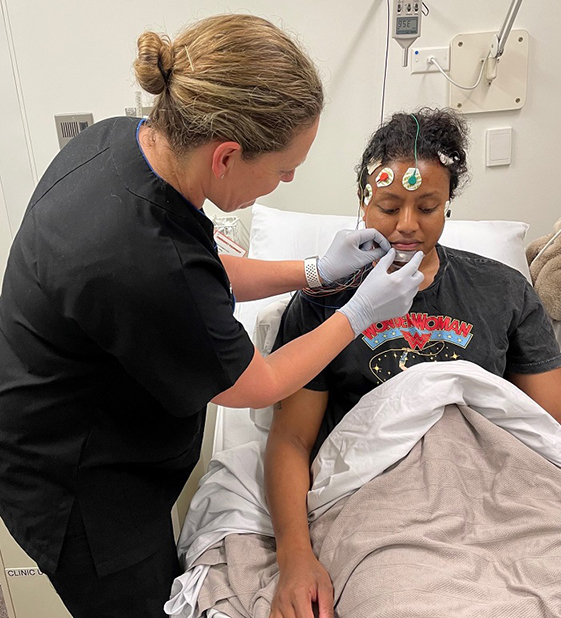The importance of sleep

30-year-old Anntoinette Mario credits her Personal Trainer with insisting she get checked after she was dizzy and short of breath at a gym session last year. Putting it down to shift work and a busy schedule, she’s grateful now to have been referred to the Sleep Disorder Clinic at SCGH for sleep study tests for a firm diagnosis and health plan going forward.
“I don’t drive anymore; I’m so tired all the time and I’m scared I’ll hurt someone,” said Anntoinette.
“Thank goodness I’m here getting this sorted out while I’m young; I’m grateful to get some treatment.”
According to Sleep Scientist Sarah Mutch, women make up about 35% of sleep study patients at SCGH, with the majority coming in for obstructive sleep apnoea, sleep hypo-ventilation or insomnia.
“There are lots of other reasons people come too like restless leg syndrome, narcolepsy and shift worker disorders, but the process is the same,” said Sarah.
“Admission is at 7pm, patients are wired up to a series of sensors, probes and 21 electrodes over the next few hours, and the study officially finishes at 6am the following morning.”
The six-bed unit is busy six nights a week conducting studies, with brain activity, eye movements, breathing rates, leg twitching and oxygen levels among the scores of assessment tools used in the complex matrix of sleep health.
“We know that between seven and nine hours of sleep is important for most people because it helps the body heal, to rest and to consolidate memory,” said Sarah.
“Being fatigued can lead to memory loss, pain and increases the risk of cardiac consequences or stroke in the future.”
When patients get a sleep disorder diagnosis it can change their life. They become rested, make better decisions and their general health and wellbeing is improved. The flow on effect to the health care sector is huge, with an estimated $1billion used for health interventions that come about through sleep disorder complications.
“Some people have sleep disorders because of neuromuscular diseases, and while we can’t cure them, we can help them sleep better and stay out of hospital for respiratory complications. The flow on effect is huge.”
Interestingly some ethnicities are more prone to sleep disorders due to their anatomical structure along with those with excessive weight and increased age. For optimum sleep health Sarah recommends good overall health and wellbeing and early intervention.

